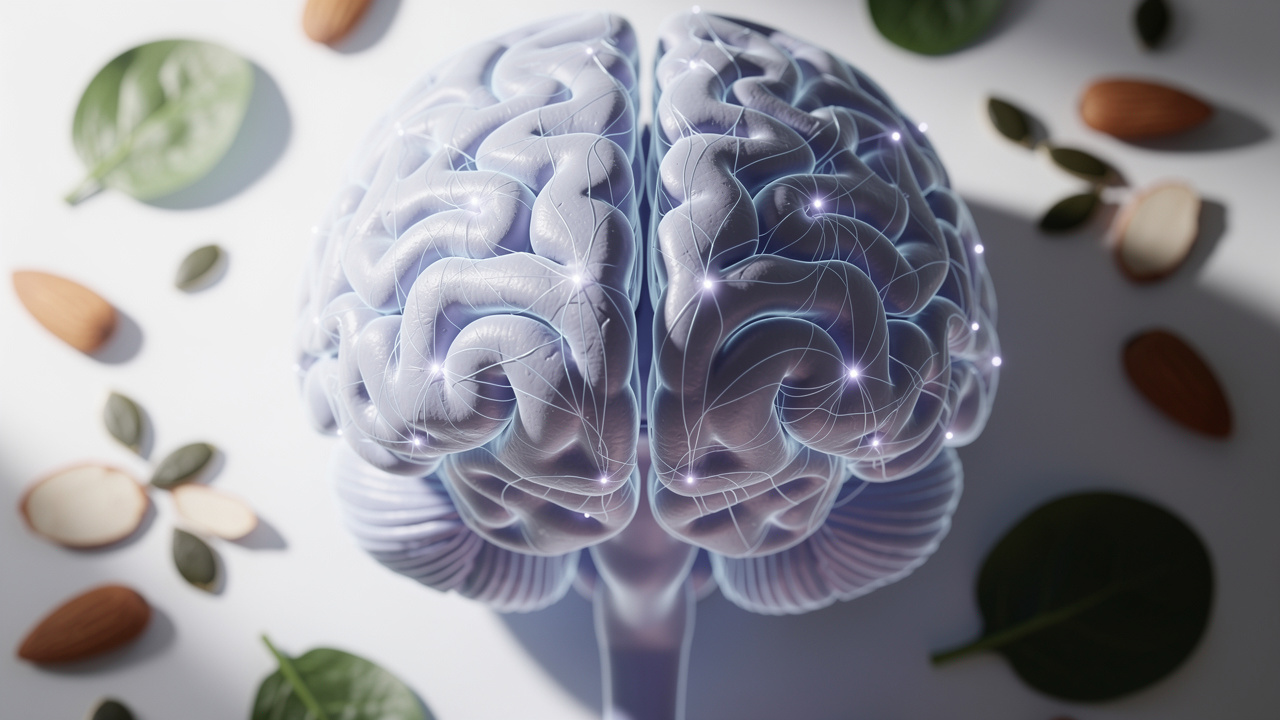The Sleep–Magnesium Connection: Understanding Its Importance For Better Rest
For many health‑conscious professionals, sleep shifts from something dependable into something unpredictable. You lie down tired, but your mind keeps turning. This is where interest in magnesium for sleep has grown: not as a sedative, but as a quiet mineral that helps the body remember how to rest.
Magnesium supports more than 300 biochemical reactions, including those that calm the nervous system, steady mood, and relax muscles. It’s also a central ingredient in sleep formulas such as SLP1’s Get To Sleep, which are designed to help you drift off and stay asleep without relying on heavy medication.
This article explains how magnesium for sleep works, who tends to benefit most, and how to use it thoughtfully—through food, supplements, and daily habits—to create conditions for deeper, more restorative nights.
“Sleep is not an optional lifestyle luxury. It is a non‑negotiable biological necessity.” — Matthew Walker, PhD
Why Magnesium For Sleep Matters
Sleep is not simply “off time.” It is an organized, repeating rhythm in which the brain, hormones, immune system, and muscles reset. Magnesium sits quietly inside this rhythm in several ways:
-
It balances calming and stimulating brain chemicals.
-
It helps the body make and respond to melatonin, the hormone that signals night.
-
It allows muscles to relax after contracting, which matters when cramps or restlessness disturb sleep.
-
It softens the stress response so evening cortisol can drop instead of staying elevated.
When magnesium intake is low over time, that rhythm can fray. People often describe:
-
Feeling “tired but wired”
-
Taking longer to fall asleep
-
Light, easily broken sleep
-
More tension in the body at night
In that sense, magnesium for sleep is less about forcing sleep and more about restoring balance in systems that already know how to rest—when they have the right support.
As many clinicians note, poor sleep is often a sign that core systems such as stress response, hormones, and nutrition are out of balance, not a stand‑alone problem.
How Magnesium Calms The Brain And Body

Magnesium’s effects on sleep come from several overlapping mechanisms. Understanding them can make your choices feel more grounded and less like guesswork.
Balancing Neurotransmitters
The brain is constantly balancing two kinds of signals:
-
Excitatory signals that keep you alert and focused
-
Inhibitory signals that tell the system it is time to slow down
Magnesium influences this balance in two important ways:
-
Blocking Excess Excitation (NMDA Receptors)
NMDA receptors are part of the brain’s “accelerator” system. When they fire too easily, the nervous system feels over‑stimulated and it becomes harder to wind down. Magnesium sits in these receptors like a gatekeeper. Adequate magnesium makes it less likely that they will fire unnecessarily, easing that sense of internal overdrive. -
Supporting GABA, The Brain’s Braking System
GABA (gamma‑aminobutyric acid) is the primary calming neurotransmitter. Many prescription sleep medications work by acting on GABA receptors. Magnesium helps those receptors respond more effectively, making it easier for the brain to let go of racing thoughts and finally get to sleep.
Supporting Melatonin And The Sleep–Wake Cycle
Your internal clock uses light, darkness, and hormones to time sleep. Melatonin rises in the evening, telling the body that night has begun.
Magnesium participates in:
-
Enzymes that help synthesize melatonin
-
The normal function of the pineal gland, where melatonin is produced
-
Cellular responses to melatonin’s “it’s time for bed” message
In clinical research on older adults with insomnia, magnesium supplementation increased blood levels of melatonin and reduced the time it took to fall asleep, as demonstrated in studies examining magnesium bisglycinate supplementation in healthy adults reporting poor sleep quality. For many people, this is exactly where magnesium for sleep feels most noticeable: a smoother transition from wakefulness into drowsiness.
Relaxing Muscles And Easing Restlessness
Every muscle contraction relies on calcium entering the cell. Magnesium balances that process by helping calcium move back out so the muscle can relax.
When magnesium is low:
-
Leg cramps become more common at night
-
Muscles feel tight or twitchy
-
Restless legs can make it hard to lie still long enough to drift into deeper sleep
Restoring adequate magnesium often softens this physical restlessness, which is why many people notice fewer nighttime cramps and a calmer body as they work with magnesium for sleep.
Softening The Stress Response
Magnesium also influences the hypothalamic–pituitary–adrenal (HPA) axis, the body’s main stress system. Under chronic stress, cortisol can stay elevated into the evening, making sleep elusive.
Research shows that magnesium can:
-
Lower nighttime cortisol
-
Support hormones like renin that are linked to deeper stages of sleep
-
Reduce subjective feelings of anxiety
For professionals who go to bed with the workday still echoing in their thoughts, this stress‑buffering effect is often where magnesium for sleep becomes especially meaningful.
Who May Benefit Most From Magnesium For Sleep
Everyone needs magnesium, but some groups are more likely to be low—and more likely to notice sleep improvements when they correct that gap.
People With A “Busy Brain” At Night
If your main complaint is an overactive mind—replaying conversations, planning tomorrow, worrying about details—magnesium’s calming effects on GABA and NMDA receptors can be particularly helpful. It doesn’t erase thoughts, but it often lowers their volume enough that you can finally get to sleep.
Individuals With Physical Sleep Disruptors
Magnesium is commonly explored by people who experience:
-
Nocturnal leg cramps
-
Restless legs sensations
-
Muscle tightness that peaks in the evening
Because magnesium helps muscles relax, it may reduce these physical interruptions and open the door to more deeper sleep.
Groups At Higher Risk For Low Magnesium
Several patterns increase the likelihood of magnesium shortfalls:
-
Older adults – Aging often brings lower intake, reduced absorption, and greater losses in urine.
-
Women – Hormonal shifts across the menstrual cycle, pregnancy, and menopause can affect magnesium needs and levels.
-
People with high stress or long work hours – Stress can change eating patterns and increase magnesium losses.
-
Regular alcohol consumers – Alcohol interferes with magnesium absorption and increases urinary loss.
-
Those relying on processed foods – Refining grains removes much of their natural magnesium.
-
People on certain medications – Proton pump inhibitors (for reflux) and some diuretics (“water pills”) are known to deplete magnesium over time.
If you recognize yourself in several of these categories and notice persistent sleep issues, it may be worth considering magnesium for sleep alongside other root causes.
Signs That Low Magnesium May Be Affecting Your Sleep
While testing is the only way to know your exact levels, certain patterns often appear when magnesium is low enough to disturb sleep.
Magnesium deficiency may significantly reduce your ability to experience deeper sleep or even fall asleep in the first place. The mineral is closely tied to GABA activity and the body’s capacity to relax.
Common signs include:
-
Difficulty Staying Asleep (Insomnia)
Waking frequently through the night, struggling to cycle back to sleep, and feeling unrested in the morning can all reflect inadequate calming signals in the brain. -
Restless Leg Sensations
An almost irresistible urge to move the legs, often worst at night, can make it hard to settle into bed. While restless legs syndrome has many causes, low magnesium is one factor that may contribute for some people. -
Muscle Cramps Or Spasms
Nighttime cramps in the calves, feet, or hands can abruptly interrupt sleep. Since magnesium is required for muscle relaxation, low levels often show up here. -
Heightened Stress And Anxiety
When magnesium is low, stress hormones tend to run higher and feel harder to down‑shift at night. This can delay both sleep onset and deeper sleep. -
Irritability And Mood Changes
Mood and sleep affect each other. Magnesium supports neurotransmitters that influence both. Irritability, low mood, and poor sleep can sometimes move together when magnesium is insufficient.
If these patterns feel familiar, exploring magnesium for sleep—along with resources like “Glycine For Sleep: A Comprehensive Guide” and guides on the sleep‑supporting properties of reishi mushroom—can be a constructive next step in a broader plan.
Food Sources Of Magnesium For Better Sleep

Supplements can be helpful, but a stable foundation comes from food. Magnesium from whole foods is absorbed gradually and comes packaged with fiber, vitamins, and other minerals that support overall health and sleep.
Because magnesium plays such a central role in promoting deeper sleep, building it into your plate is a gentle way to support your nights day after day.
Recommended Daily Intake
For adults in the US, the recommended daily allowance (RDA) for magnesium is:
-
Men 19–30: 400 mg/day
-
Men 31+: 420 mg/day
-
Women 19–30: 310 mg/day
-
Women 31+: 320 mg/day
(Needs are slightly higher during pregnancy and breastfeeding.)
Magnesium-Rich Foods
Here are some accessible options to incorporate:
|
Food |
Approx. Magnesium (mg) |
|---|---|
|
1 cup cooked spinach |
~157 |
|
1 oz pumpkin seeds |
~156 |
|
1 cup cooked black beans |
~120 |
|
1 cup cooked quinoa |
~118 |
|
1 oz almonds |
~80 |
|
1 medium avocado |
~58 |
|
6 oz salmon fillet |
~50+ |
|
1 oz dark chocolate (70–85%) |
~64 |
|
1 cup plain yogurt |
~42 |
|
1 large banana |
~37 |
A simple day could easily meet the RDA with:
-
1 cup cooked spinach
-
1 cup cooked quinoa
-
1 oz almonds
Together, these already exceed 300 mg of magnesium and move your body toward the nutrients it needs for calm evenings and more deeper sleep.
Mineral‑rich drinking water and whole grains such as oats or brown rice can add even more steady background intake.
Choosing A Magnesium Supplement For Sleep

For many people, diet alone doesn’t fully close the gap—especially when stress, travel, or appetite changes are involved. That is where magnesium for sleep in supplement form can help.
Different forms of magnesium behave differently in the body. Understanding the distinctions can make it easier to choose what fits you, instead of relying purely on trial and error.
Common Forms Of Magnesium For Sleep
|
Form |
Pros |
Cons |
Often Chosen When… |
|---|---|---|---|
|
Magnesium glycinate |
Gentle on digestion, well absorbed, calming glycine partner |
Usually more expensive |
Sleep, anxiety, long‑term nightly use |
|
Magnesium citrate |
Well absorbed, supports bowel regularity |
Often causes loose stools or urgency |
Sleep + constipation |
|
Magnesium oxide |
Inexpensive, used in some sleep studies |
Lower absorption, more GI side effects |
Budget is a main concern |
-
Magnesium glycinate pairs magnesium with the amino acid glycine, which has its own calming effects and is frequently discussed in “Glycine For Sleep: A Comprehensive Guide.” This form is often preferred in formulas designed specifically for deeper sleep.
-
Magnesium citrate can be effective for sleep but is best for those who also welcome its laxative effect.
-
Magnesium oxide was used in the major clinical trial on insomnia in older adults. Despite modest changes in blood levels, sleep improved—suggesting that even forms with lower absorption can be helpful in some contexts.
For some, a thoughtfully designed blend like SLP1’s Get To Sleep or Deeper Sleep feels simpler than assembling a regimen piece by piece.
A Note On Topical Magnesium
Sprays, “magnesium oils,” and gels are widely marketed, but current evidence suggests that absorption through the skin is limited and inconsistent. They may feel relaxing as part of a bedtime ritual, especially when combined with warm water or soothing scents, but they are unlikely to deliver the same systemic benefits for magnesium for sleep that oral intake provides.
What The Research Says About Magnesium For Sleep
Several clinical trials have explored magnesium’s impact on insomnia and sleep quality.
One well‑designed study in older adults with primary insomnia used 500 mg of magnesium daily for eight weeks and found:
-
Shorter time to fall asleep
-
Longer total sleep time
-
Better sleep efficiency (more of the time in bed spent actually sleeping)
-
Fewer early‑morning awakenings
-
Higher blood melatonin levels
-
Lower nighttime cortisol
-
Increased renin, a hormone associated with deeper sleep stages
These biochemical shifts mirror what many people report subjectively when they add magnesium for sleep: instead of lying awake, they ease into sleep more smoothly and stay there more reliably.
Other studies, including research on stress, anxiety, and restless legs, point in the same direction. While results vary, the overall picture suggests that magnesium can be a meaningful support, especially in people who start out with low intake.
While no supplement can replace healthy sleep habits, this body of research supports magnesium as a helpful piece of a broader strategy—especially when deficiency, chronic stress, or muscle tension are part of the picture.
How To Use Magnesium For Sleep Safely
Thoughtful use matters as much as the supplement itself. A calm, stepwise approach reduces the chance of side effects and respects individual variation.
Typical Dosage Range
For adults with healthy kidneys, a commonly recommended range for magnesium for sleep from supplements is:
-
200–350 mg of elemental magnesium, taken once in the evening
“Elemental magnesium” is the actual magnesium content, not the total weight of the compound (for example, magnesium glycinate). Always check labels carefully.
The general upper limit from supplements for most adults is 350 mg per day, not counting magnesium from food. Higher doses, such as the 500 mg used in some clinical trials, are best reserved for situations where a healthcare professional is monitoring you.
Many people start at the lower end (around 200–250 mg) and slowly increase if needed. Notice not just whether you fall asleep faster, but also whether you:
-
Feel more refreshed on waking
-
Experience fewer night‑time awakenings
-
Sense that your deeper sleep is improving
Safety Considerations
Before starting any supplement—especially if you have ongoing health conditions—talk with a healthcare professional. Key points include:
-
Kidney health
The kidneys clear excess magnesium. Anyone with reduced kidney function should only take magnesium under medical supervision. -
Medication timing
Magnesium can interfere with the absorption of some antibiotics and osteoporosis medications. Taking them at least two hours apart is usually advised. Discuss other prescriptions, especially those for heart rhythm or blood pressure, with your clinician. -
Possible side effects
The most common are digestive: loose stools, cramping, or nausea, especially at higher doses or with citrate and oxide forms. Reducing the dose or switching to a gentler form like magnesium glycinate often helps.
Integrating Products Thoughtfully
You might choose:
-
A stand‑alone magnesium glycinate capsule
-
A comprehensive sleep formula like Get To Sleep for bedtime support
-
A product such as Deeper Sleep if maintaining deep, uninterrupted sleep is your main concern
Whichever you choose, let your body guide the pace, and give any change several weeks before deciding whether it is helping.
Combining Magnesium With Other Natural Sleep Supports
Magnesium rarely acts alone in the body. Many SLP1 readers explore it alongside other gentle supports that work through complementary pathways.
Glycine
Glycine is an amino acid known to:
-
Slightly lower core body temperature
-
Support serotonin and GABA activity
-
Improve subjective sleep quality in some studies
Because magnesium glycinate already includes glycine, it is a natural choice when you’re interested in both. For a deeper look at this pairing, resources such as “Glycine For Sleep: A Comprehensive Guide” can help you understand how glycine and magnesium for sleep can work together.
Reishi Mushroom
Reishi has a long history of traditional use for calm and resilience under stress. Modern interest focuses on its:
-
Gentle effects on the stress response
-
Potential to ease anxious feelings that peak in the evening
For some, a magnesium‑based sleep routine plus a reishi‑containing product—guided by a resource on the sleep‑supportive properties of reishi mushroom—feels more complete than either alone. The goal is not sedation, but a steady internal climate in which deeper sleep becomes more likely.
Weaving Magnesium For Sleep Into A Healthy Nighttime Routine

Magnesium works best when it’s part of a broader rhythm that honors sleep rather than fighting it. Think of it as one supportive element in the way you close the day.
Consider combining magnesium for sleep with these habits:
-
Keep A Consistent Schedule
Go to bed and wake up at roughly the same time daily, even on weekends. Your internal clock learns this pattern. -
Create A Simple Wind‑Down Ritual
The last 30–60 minutes before bed are not for email. Read a physical book, stretch gently, journal, or listen to calming audio. This is often the ideal window to take your magnesium supplement or your Deeper Sleep or Get To Sleep formula. -
Shape Your Environment For Rest
Cool, dark, and quiet conditions signal the nervous system that it is safe to let go. Blackout curtains, fans, white‑noise apps, or earplugs can all help your brain associate the bedroom with deeper sleep, not stimulation. -
Give Screens A Curfew
Blue light from phones, tablets, and laptops suppresses melatonin. If possible, stop screen use at least an hour before bed, or use blue‑light filters as a second‑best option. -
Be Mindful With Caffeine And Alcohol
Afternoon coffee and evening drinks can both reduce sleep depth, even if you fall asleep quickly. Pairing magnesium for sleep with small shifts here often creates a noticeable difference. -
Move Your Body During The Day
Regular physical activity increases sleep pressure at night and can ease anxiety. Aim to finish intense workouts at least a few hours before bed.
With these pieces in place, magnesium has a friendlier environment in which to do its quiet work.
A helpful mindset is to view sleep care like dental care: small, regular habits matter far more than quick fixes used once in a while.
Closing Thoughts: A Gentle, Long-View Approach To Magnesium For Sleep
Sleep is both biological and deeply personal. There is no single ingredient that guarantees a perfect night, but some supports help the system remember what it already knows. Magnesium is one of them.
By:
-
Eating magnesium‑rich foods
-
Choosing supplement forms that fit your body
-
Respecting safety guidelines
-
Pairing everything with consistent sleep habits
you give your nervous system the conditions it needs to soften, settle, and return more often to deeper sleep.
For many health‑conscious professionals and wellness‑minded individuals, this calm, stepwise approach to magnesium for sleep offers something important: not a quick fix, but a sustainable way to invite rest back into the center of a busy life.



Leave a comment
This site is protected by hCaptcha and the hCaptcha Privacy Policy and Terms of Service apply.